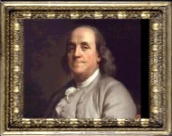

Benjamin Franklin

January 17, 1706 - April 17, 1790
Inventor
What He Did:
In 1743, he invented a heat-efficient stove -- called the Franklin stove -- to help warm houses efficiently. As the stove was invented to help improve society, he refused to take out a patent. Among Franklin's other inventions are swim fins, the glass armonica (a musical instrument) and bifocals.
In the early 1750's he turned to the study of electricity. His observations, including his kite experiment which verified the nature of electricity and lightning brought Franklin international fame.
What He Said:
“God governs in the affairs of man. And if a sparrow cannot fall to the ground without his notice, is it probable that an empire can rise without His aid? We have been assured in the Sacred Writings that except the Lord build the house, they labor in vain that build it. I firmly believe this. I also believe that, without His concurring aid, we shall succeed in this political building no better than the builders of Babel” – Constitutional Convention of 1787
“In the beginning of the contest with Britain, when we were sensible of danger, we had daily prayers in this room for Divine protection. Our prayers, Sir, were heard, and they were graciously answered… do we imagine we no longer need His assistance?” [Constitutional Convention, Thursday June 28, 1787]
In Benjamin Franklin's 1749 plan of education for public schools in Pennsylvania, he insisted that schools teach "the excellency of the Christian religion above all others, ancient or modern."
In 1787 when Franklin helped found Benjamin Franklin University, it was dedicated as "a nursery of religion and learning, built on Christ, the Cornerstone."